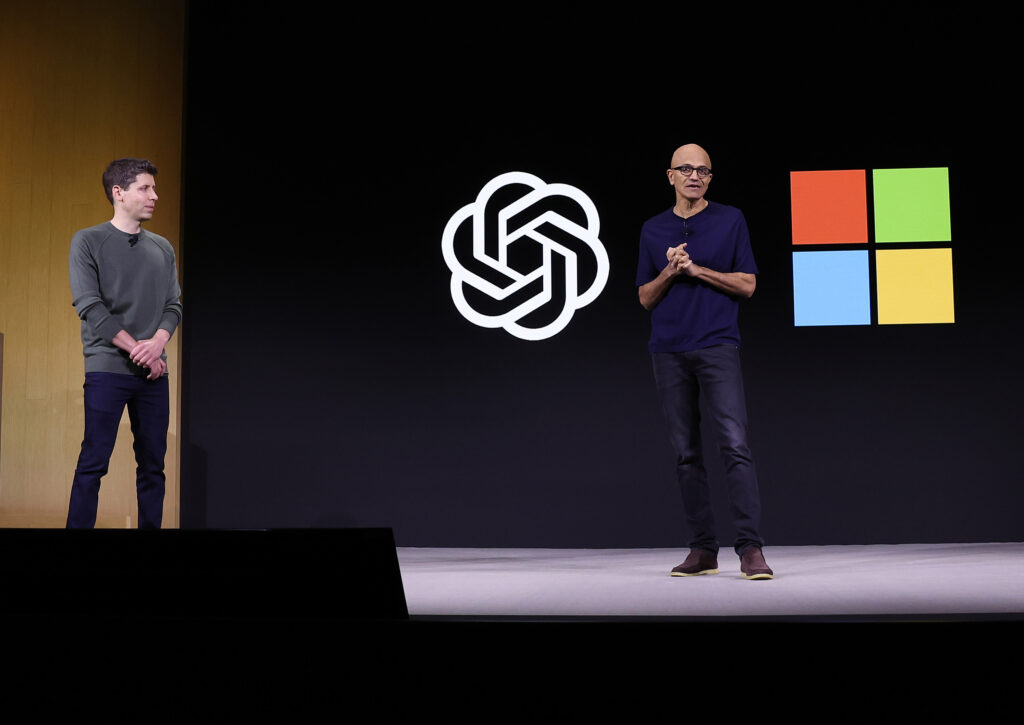In order to resolve regulatory concerns raised by antitrust authorities in Europe, the UK, and the US, Microsoft has made the strategic decision to resign its board observer seat at OpenAI. The choice comes after OpenAI’s governance significantly improved over the previous eight months, when CEO Sam Altman took back the company’s leadership. The focus of regulatory investigation on both sides of the Atlantic has been Microsoft’s role in OpenAI, namely its non-voting observer status on the board.
Initially, Microsoft took a non-voting observer position on OpenAI’s board in November last year. This role allowed Microsoft to attend board meetings and access confidential information, though it did not confer voting rights on critical matters such as electing or choosing directors. The observer seat, coupled with Microsoft’s substantial $10 billion investment in OpenAI, raised concerns among antitrust watchdogs about the extent of control Microsoft might exert over the AI startup. These concerns were particularly pronounced given the growing importance of AI technology and the competitive dynamics of the tech industry.
Microsoft highlighted several reasons for its decision to step back from the observer role. Over the past eight months, OpenAI has made significant progress under the renewed leadership of Sam Altman. The company’s governance has improved markedly, and it has forged new partnerships, driven innovation, and expanded its customer base. In a letter to OpenAI dated July 9, Microsoft expressed confidence in the direction of the company and stated that their limited role as an observer was no longer necessary. This move is seen as a way to demonstrate OpenAI’s independence and alleviate regulatory concerns.
EU antitrust regulators recently concluded that the Microsoft-OpenAI partnership does not fall under the bloc’s merger rules, primarily because Microsoft does not have control over OpenAI. However, they have indicated that they will seek third-party opinions on the exclusivity clauses within the agreement. This nuanced approach reflects the complexity of the relationship between Microsoft and OpenAI, which involves substantial financial investment and strategic collaboration without direct control. In contrast, antitrust authorities in the UK and the US continue to scrutinize the partnership, raising concerns about Microsoft’s influence over OpenAI and questioning the startup’s independence.
The regulatory landscape for AI technology is evolving rapidly, and companies like Microsoft and OpenAI are navigating a complex web of rules and guidelines designed to ensure competition and prevent monopolistic practices. Microsoft’s decision to give up its board observer seat is a strategic move aimed at demonstrating its commitment to regulatory compliance and addressing antitrust concerns. By stepping back from a formal role in OpenAI’s governance, Microsoft aims to show that it respects the independence of the AI startup and is committed to fair competition in the AI market.
In the competitive landscape of AI technology, both Microsoft and OpenAI are striving to sell their solutions to enterprise customers. This market is highly lucrative, with businesses across various industries seeking to leverage AI to enhance efficiency, drive innovation, and gain competitive advantages. By focusing on enterprise sales, Microsoft and OpenAI aim to generate substantial revenue and demonstrate the practical applications of their AI technologies. This competitive drive is also part of their strategy to showcase their independence and address regulatory concerns about potential monopolistic practices.
Microsoft’s broader strategy in the AI space involves expanding its offerings on the Azure platform, which is a key component of its cloud computing business. Azure provides a range of AI services, including machine learning tools, cognitive services, and infrastructure for deploying AI models. By enhancing its AI capabilities on Azure, Microsoft aims to attract more enterprise customers and compete with other tech giants in the cloud computing and AI markets. The recent hiring of Inflection’s CEO to lead Microsoft’s consumer AI division is another strategic move aimed at diversifying the company’s AI portfolio and expanding beyond its partnership with OpenAI.
This diversification strategy reflects Microsoft’s recognition of the growing importance of AI across different segments of the market. While enterprise applications of AI are critical for generating revenue and driving business growth, consumer AI applications also represent a significant opportunity. By investing in consumer AI, Microsoft aims to develop products and services that can appeal to a broader audience and enhance its competitive position in the tech industry. This balanced approach ensures that Microsoft can leverage its strengths in both enterprise and consumer markets to drive innovation and maintain its leadership in the AI space.
OpenAI, on the other hand, continues to focus on advancing AI research and developing cutting-edge AI technologies. The company’s mission is to ensure that artificial general intelligence (AGI) benefits all of humanity, and it strives to develop safe and broadly beneficial AI. Under Sam Altman’s leadership, OpenAI has made significant strides in AI research, and its products, such as the generative AI chatbot ChatGPT, have gained widespread recognition and adoption. The company’s growing customer base and new partnerships reflect its success in translating research advancements into practical applications.
Their strategic choices will continue to influence the direction of AI technology as Microsoft and OpenAI negotiate the legal and competitive environment of the AI market. In order to allay regulatory worries and show its dedication to fair competition, Microsoft has decided to give up its board observer seat. This decision also emphasizes how critical it is to preserve the autonomy of AI firms like OpenAI, which are essential for fostering innovation and improving the state of the field. For years to come, the AI industry’s course will be determined by how these businesses develop and broaden their AI products. Customers, rivals, and regulators will be keenly monitoring their every move.
If you like the article please follow on THE UBJ.
